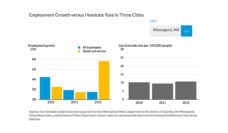On the afternoon of May 31st, twelve Americans were murdered in Virginia Beach, the latest in an ever-growing list of mass shooting victims. The extent of the United States’ gun violence epidemic is truly staggering. In 2018, 40,000 Americans died from firearms, the most in 40 years. Mass shootings involving four or more victims now occur nearly every day.
In the wake of mass shootings, media coverage of gun violence often addresses the shooter’s mental health. Between 1997 and 2012, news stories were more likely to point to serious mental illnesses than the weapons themselves as a cause of gun violence. This focus contributes to public fear of those with mental illnesses and support for restricting their access to firearms. In turn, just last year, legislators in 27 states enacted laws that permit restrictions of gun ownership for individuals with mental illnesses.
Past investigations into the link between mental health and gun violence have been limited in one way or another. For example, studies that examine rates of violence among those with severe mental illnesses like schizophrenia may not represent the general population (where more common mental health conditions are present). On the other hand, analyses of the general population have not tracked participants over time, preventing conclusions about how predictive mental illnesses are of gun violence.
Except for hostility, symptoms of mental illness were not associated with gun violence.
Researchers used data from an ongoing study of more than 1,000 young adults in Texas to evaluate whether preexisting mental health conditions could lead to gun violence. In spring 2015, participants rated themselves for a variety of mental health variables, including conditions like anxiety, depression, post-traumatic stress disorder, and symptoms, like stress, hostility, and impulsivity. In addition, participants indicated if they carried a gun. Two years later, they were asked if they had received mental health treatment and whether they had access to, and had threatened someone with, a gun.
Except for hostility, symptoms of mental illness were not associated with gun violence. Participants who rated themselves as having a hostile demeanor were 3.5 times more likely to have threatened someone with a gun.
Individuals with access to guns, compared to those without, were 18 times more likely to have threatened someone with a gun. Importantly, the finding also aligns with prior research concluding that high rates of gun ownership are associated with high rates of gun-involved homicides.
This new study is the first to assess which mental health conditions or symptoms are more likely to lead to future gun violence. Contrary to prevailing media and public opinion narratives, the researchers found that broadly curbing access to firearms, and not just limiting the purchasing ability of those with diagnosable mental illnesses, appears far more likely to impact our nation’s gun violence situation.
Photo by Robina Weermeijer on Unsplash














